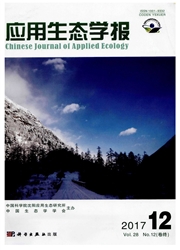

 中文摘要:
中文摘要:
以甘蓝型油菜(湘农油571)为试验材料,通过溶液培养研究了外源四价硒条件下,油菜幼苗硒吸收分配、生理特性及根系形态的变化。结果表明:油菜幼苗的硒富集能力随施硒量增加显著降低,而硒分配系数一直稳定在0.9左右,不受硒浓度影响。10μmolL-1硒可以通过显著改善油菜幼苗根系生理指标和根系形态来促进油菜幼苗的生长,其对生理指标的影响主要表现为:显著降低油菜幼苗根系超氧阴离子自由基(O2)产生速率并显著提高超氧化物歧化酶(SOD)、过氧化物酶(POD)和过氧化氢酶(CAT)活性,从而显著降低根系的膜脂过氧化物质(MDA)含量,降幅达26.0%,进而显著提高根系活力,增幅达17.4%;其对构型指标促进程度依次为:根体积〉总表面积〉分根数〉总根长〉根尖数〉平均直径,但这些正效应均与1μmolL-1硒处理无显著差异,表明少量硒(≤10μmolL-1)可以通过提高油菜幼苗根系抗氧化酶活性和降低膜脂过氧化物含量,来提高根系活力和改善根系构型,最终促进油菜幼苗的生长。
 英文摘要:
英文摘要:
The rape (Brassica napus L. ev. Xiangnongyou 571 ) was chosen as the experimental ma- terial to undergo solution cultivation at seedling stage to investigate the effects of selenite addition on the selenium (Se) absorption and distribution, root morphology and physiological characteristics of rape seedlings. The results showed that the bioaccumulation ability of Se decreased significantly with increasing the Se application rate, but the Se distribution coefficient remained around 0.9 with no significant influence. The application of 10 μmol · L-1 selenite stimulated the growth of rape seed- lings through improving the root physiological characteristics and root morphology significantly, in- cluding significantly increasing the production of superoxide radical ( O2 - ) rate and the activities of superoxide dismutase (SOD), peroxidase (POD) and fungal catalase (CAT) in the root system, which resulted in a reduction of the lipids peroxidation (MDA) content as much as 26.0%, conse- quently increasing the root activity as much as 17.4%. The promoting degrees of selenite on root morphological parameters were from strong to weak in such a tendency: root volume 〉 total surface area 〉 number of root forks 〉 total root length 〉 number of root tips 〉 average diameter. However, such positive effects had no significant difference with those in treatment with 1 μmol · L-l selenite, indicating that small amounts ( ≤ 10 μmol · L-1 ) of selenite were able to increase the activity of an- tioxidant enzymes and reduce the content of MDA in root system, which could increase root activity and improve root morphology, hence increased the biomass of rape seedlings.
 同期刊论文项目
同期刊论文项目
 同项目期刊论文
同项目期刊论文
 Effect of sulphate onselenium uptake and translocation in rape (Brassica napus L.) suppliedwith sele
Effect of sulphate onselenium uptake and translocation in rape (Brassica napus L.) suppliedwith sele 期刊信息
期刊信息
